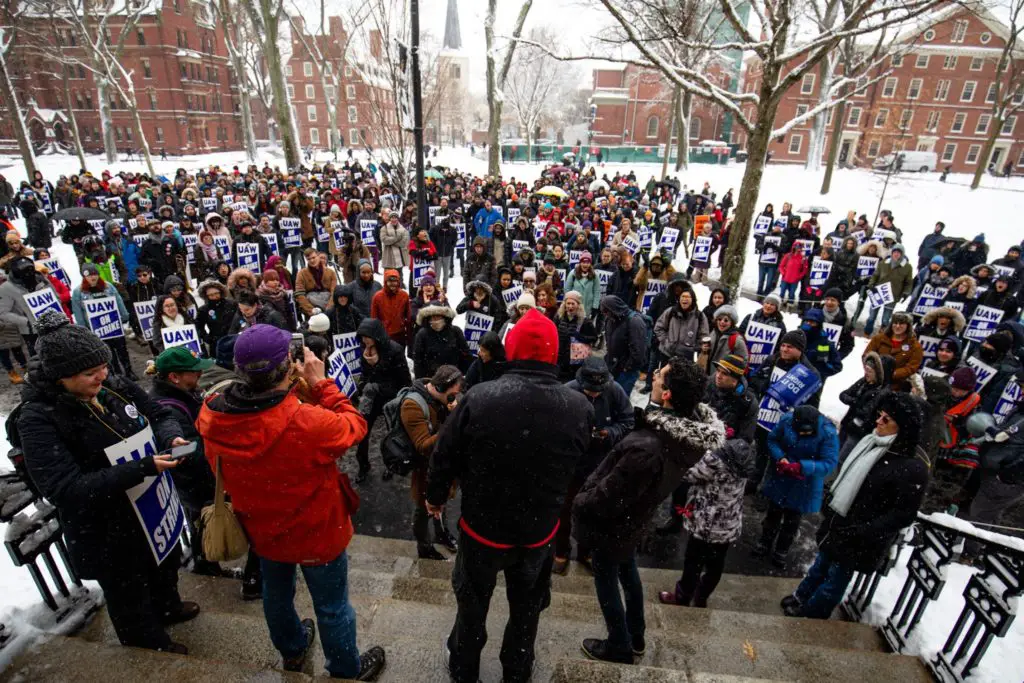The National Labor Relations Board is ending a period of public comment on a new rule that would end the recognition of private institution graduate students as employees under the National Labor Relations Act, a move that would effectively end their ability to organize unions.
Graduate students have been organizing unions dating back to the 1960s beginning with Rutgers University and the City University of New York being the first to include graduate students’ unions in collective bargaining agreements. Organizing efforts throughout the decades have been largely successful at public universities, where student workers who choose to organize have more protections.
Organizing has proven more difficult at private institutions, in large part because students at private universities are subject to the rulings of the NLRB which chooses whether to recognize those students as employees with bargaining rights. The National Labor Relations Board has made a series of back and forth decisions on this issue for decades. In just the last 20 years, the board has changed its ruling on three occasions.
In 2000, the NLRB ruled that graduate students who receive compensation for teaching and research at New York University could unionize before a 2004 ruling that students at Brown University could not. Most recently, in 2016, the NLRB again ruled that students at Columbia University could unionize.
The NLRB is subject to presidential appointments, which explains the constant flip-flop, as the NLRB tends to rule against student organizing under Republican administrations while ruling in favor under Democratic administrations.
The new rule could generate uncertainty for graduate students at private universities, like those at Harvard, where the university recognized the graduate students’ union in 2018 and began the bargaining process later that year.
Although private institutions aren’t likely to officially recognize graduate students’ unions under the new ruling, Cynthia Estlund, a Labor Law Professor at New York University told The College Post it’s still possible for students to extract concessions from their employers under certain circumstances.
“It is possible for energetic, creative groups of workers to make it in the interest of an employer to make concessions, even if they don’t have the right to engage in concerted activity, collective bargaining, or union organizing under the National Labor Relations Act,” Estlund said. “But it does mean that they are not protected against reprisals.”
According to Estlund, Universities aren’t as likely as corporations like Wal-Mart to overtly penalize workers, but if graduate students do feel like their employer is penalizing them, they will no longer have any legal recourse.
Nathan Ellstrand, an organizer for the graduate students’ union at Loyola University Chicago, told The College Post he began organizing shortly after the NLRB’s Columbia ruling in 2016. Ellstrand said the ruling “opened the floodgates” for unions like the United Auto Workers, the American Federation of Teachers, and the Service Employees International Union to organize graduate students at private institutions.
“I asked our graduate program director and the interim dean of our graduate school if there was a union and they both said no and that possibility of there being one was little to none,” Ellstrand said. “Literally, a week later, I was approached by an organizer from SEIU about how there was organizing effort at Loyola to form a graduate workers union.”
Ellstrand explained a graduate students’ union at Loyola seemed like a “natural extension” for the SEIU, as the union had previously organized for non-tenure track faculty on the campus a year prior. In the years since organizing began in 2016, while the Loyola administration has still not yet recognized the union, Ellstrand said graduate students have won increased stipends, increased funding for travel expenses, and dental insurance.
“We’re still pushing for recognition, but we’re also shifting…towards an issue-based campaign because it looks like the university won’t bargain with us,” Ellstrand said. “We’re partnering up with AFT and other unions nationwide and really pushing this campaign against the potential rule change...so it’s really something to have solidarity across unions.”
While public university graduate students will not be affected by the ruling, multiple public university graduate student unions expressed solidarity with their counterparts at private institutions.
“Graduate Employee Organization United Auto Workers 2322 is in solidarity with Harvard and will continue to support the right of all workers to organize, especially as this particular NLRB decision has seen as many flip flops as it has seen governments,” GEO UAW 2322 Co-Chair Jyoti Iyer told The College Post.
Representatives from the University of Connecticut and the University of Michigan Graduate Employee Organizations offered similar expressions of solidarity with their counterparts at private institutions.

